- Market Facts & Opinions (2000) Ltd
- mfo@mfocaribbean.com
- Tel: (868) 627-8417/8524
T&T Judiciary: Public Opinion Poll June 2017


The events in the Trinidad and Tobago Judiciary invoked much press coverage and interest by public figures. The events included a resignation of a High Court Judge, who later claimed in a letter to the T&T’s President Anthony Carmona that her resignation letter is “of no legal effect” because she was forced by the Chief Justice to do so. Later there was a “No Confidence” vote in the Chief Justice by the Law Association and call for both the Chief Justice and the JLSC resign. Some commentators invoked the public interest and believed that the action taken was supported by the public. However, what does the proverbial ‘man in the street’ think about the situation? Rather than assume the views of the public, MFO was commissioned by the Trinidad Express Newspapers to ascertain the sentiments of the T&T public through a Public Opinion Poll. This study seeks to identify the following:
1. Is this issue involving the Judiciary perceived as important as other news stories carried at the same time?
2. Should the Chief Justice apologise for the “Marcia Ayers- Caesar” situation?
3. Was the “No Confidence” vote by the Law Association is seen as being in the best interests of the country?
4. Should the Chief Justice and the JLSC resign?
5. Has this situation hurt the country?
Public Opinion Poll Methodology
Three hundred and forty-six (346) telephone interviews were conducted between June 5th and June 8th. This sample size will yield a margin of error of 5% at a 95% confidence level. The sample was drawn using two approaches:
A. randomly selected directory listed landline telephone numbers
B. randomly generated mobile numbers.
The sample represents the national distribution of gender, ethnicity and location (which includes Tobago). A total of 30 interviews was terminated at the request of the interviewee after the first question was fielded. These persons had a significantly lower awareness of all four of the news stories tested than the final sample.
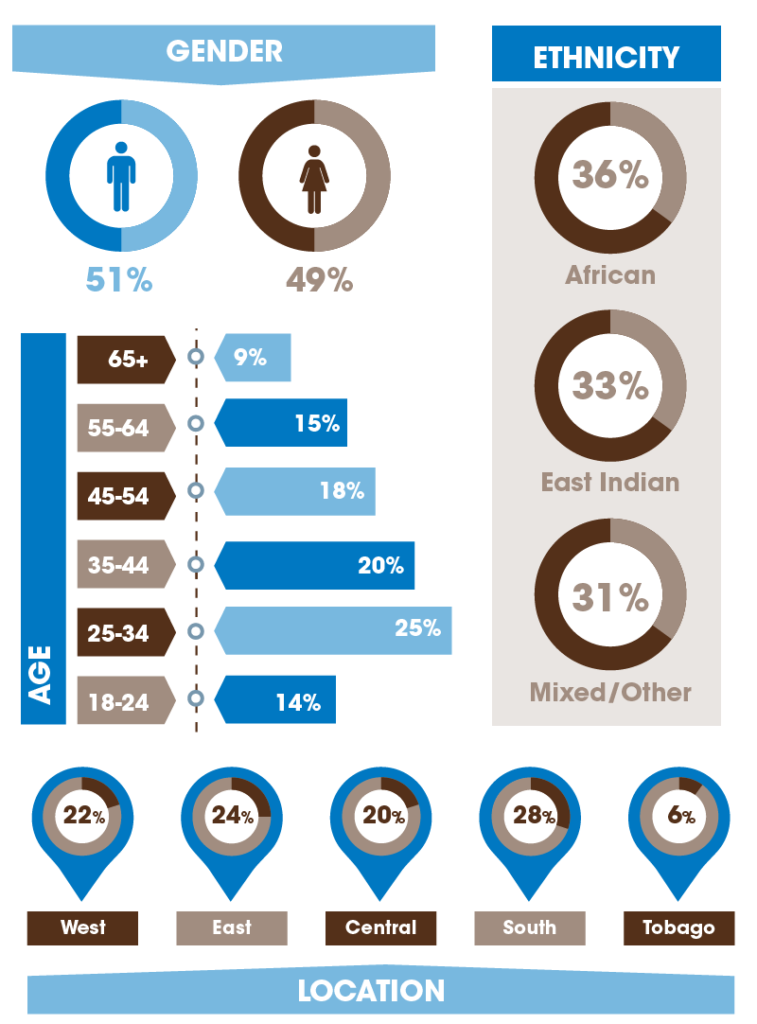
Current News
The Public Opinion Poll topic of the vote of ‘no confidence’ in the Chief Justice and the appointment of new judges was not the top story of interest among the four main news stories in the last four weeks.
It was followed either “very or fairly closely” by fewer respondents than the two top stories – the Property Tax and the Tobago Ferry – (47% compared to 75%).
One in four persons did not follow the story closely at all.
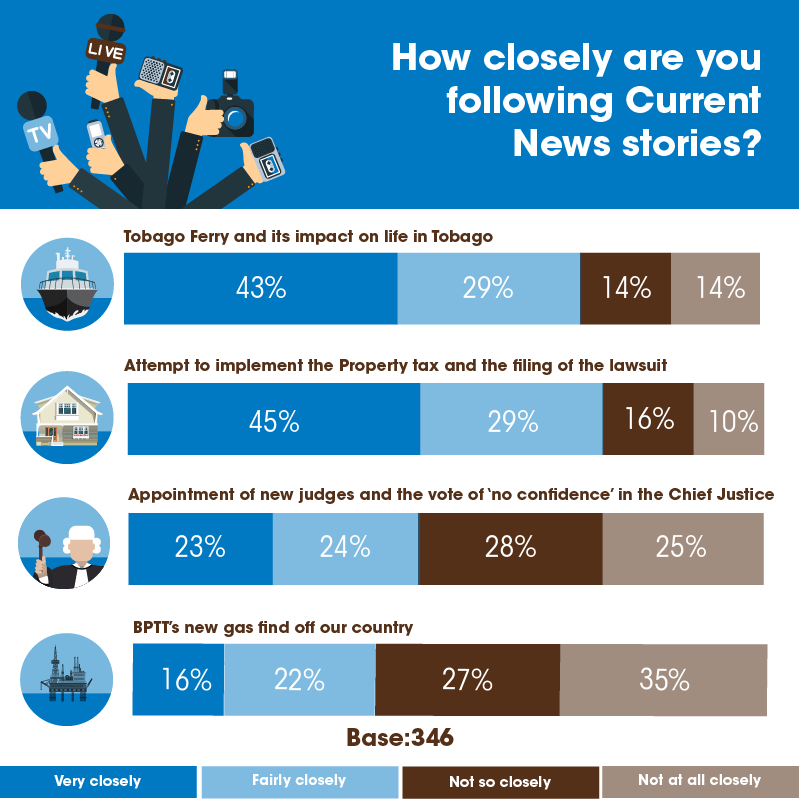
On the Issue of the Judiciary
Interested Audience (Respondents following the story very or fairly closely)
An analysis of this group indicates that these persons are more likely to be of the higher socio- economic (66%) than any other socio-economic group. The 35 – 54 age cohort (55%) had the most interest among the various age groups. Men (51%) are more likely than their female counterparts (43%) to be following the story closely. While a similar proportion of East Indian persons (51%) followed the story, this means that this group is split on the significance of the story. Persons who lived in South Central (60%), Diego Martin, Port of Spain (53%) and Couva/Tabaquite/Talparo (53%) were the most interested. Persons with either a University level degree or a post graduate degree were the ones interested in the story (50%)
Disinterested Audience (Respondents following the story not so closely or not at all closely)
Those reporting a lack of interest were more likely to be from the middle socioeconomic group (57%) and younger citizens under 34 years (63%). The African (57%) and the Mixed/ Other (54%) ethnic groups were uninterested. The South East (79%) and Tobago (63%) were the areas with the least interest. The highest level of disinterest was registered among persons whose highest level of education was either Primary or Secondary level (56% and 54 % respectively).
The Judiciary and an Apology
Our Public Opinion Poll asked persons if they felt that the Chief Justice should have apologized for the appointment of the former Chief Magistrate. Half of the respondents believed that the Chief Justice should have apologized but this is heavily influenced by those in the interested audience.
Two-thirds of those who were in the interested audience (either followed the story very or fairly closely) held the view that the CJ should apologies (62%) compared to the 42% of those not following the story closely. For both audiences (interested and disinterested) three in ten persons believed that there ought to be no apology. But there was a wide gap between the audiences with 30% of the disinterested audience having no opinion.
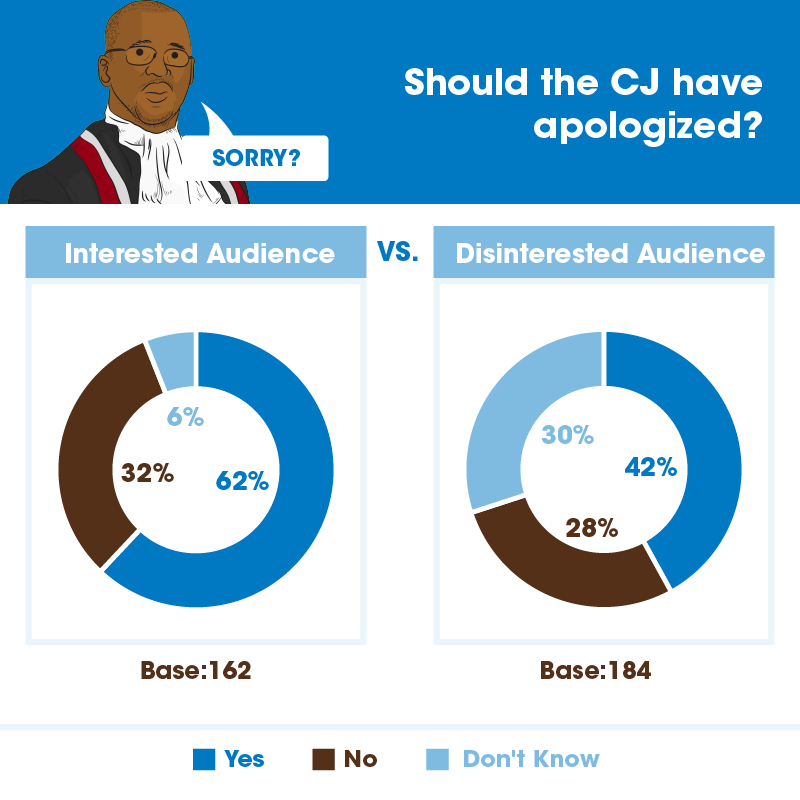
The Judiciary and An Apology- Further Comments
Respondents more likely to agree that the CJ should apologize tend to be following the story closely (very or fairly closely). Those not following closely are more likely to not express an opinion (don’t know).
The 52% of respondents who agree that there should be an apology is more likely to be older respondents (45-54years and over 65) and also to be persons of East Indian descent. These respondents are more likely to approve of the register of ‘no confidence’ vote in the CJ and to hold the view that the incident has caused a great deal or a fair amount of damage to the country. However, there is a split in opinion on whether there is a need for resignation.
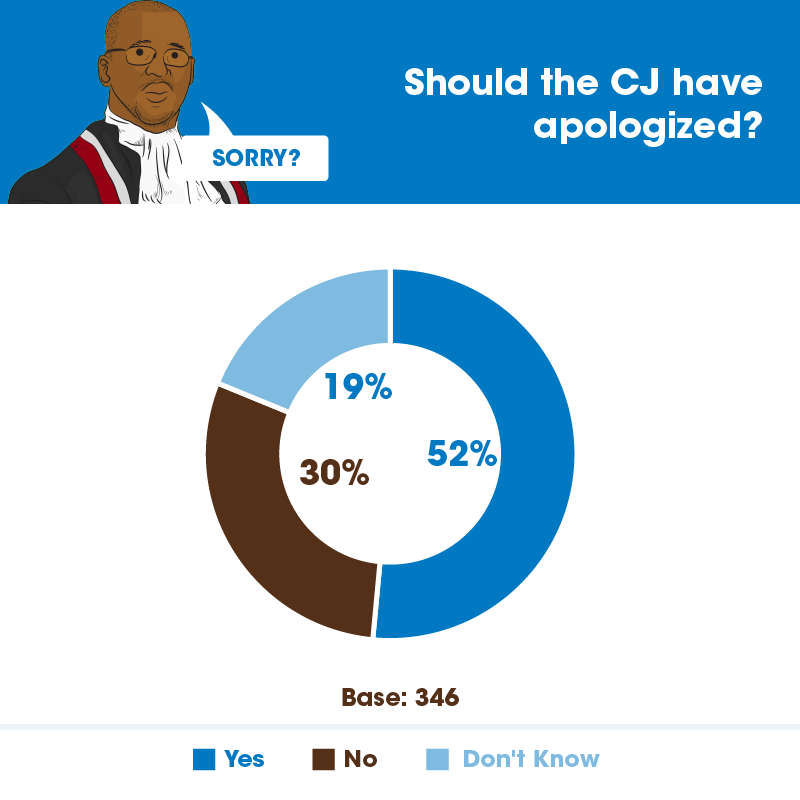
This can be understood in the light of comments made by the respondents. While some agree that the Chief Justice should apologize for the lack of judgement, he ought not to resign but should resolve the issue in which he played a part.
Persons who believed there was no need for an apology were more likely to be of African or Mixed descent and to hold a University first degree. They were more likely to disapprove of the vote registered at the June 1st meeting and to be in strong disagreement with the call for the resignation of the Chief Justice. These participants were also more likely to opine that the country suffered ‘not very much’ or ‘not at all’ by this occurrence.
Approval for the Lawyers’ Vote
Less than half of the total sample (46%) support the vote of ‘no confidence’ by the Law Association. This outcome is heavily influenced by the persons who report that they did not follow the story closely. Three in every five persons that showed interest in this story approves of the ‘no confidence’ vote by the lawyers against the CJ. A third of this group disapprove of the vote. Of the disinterested audience, only a third approve of the vote but 40% disapprove of it. A quarter of them (26%), do not hold an opinion on this matter (Don’t know).
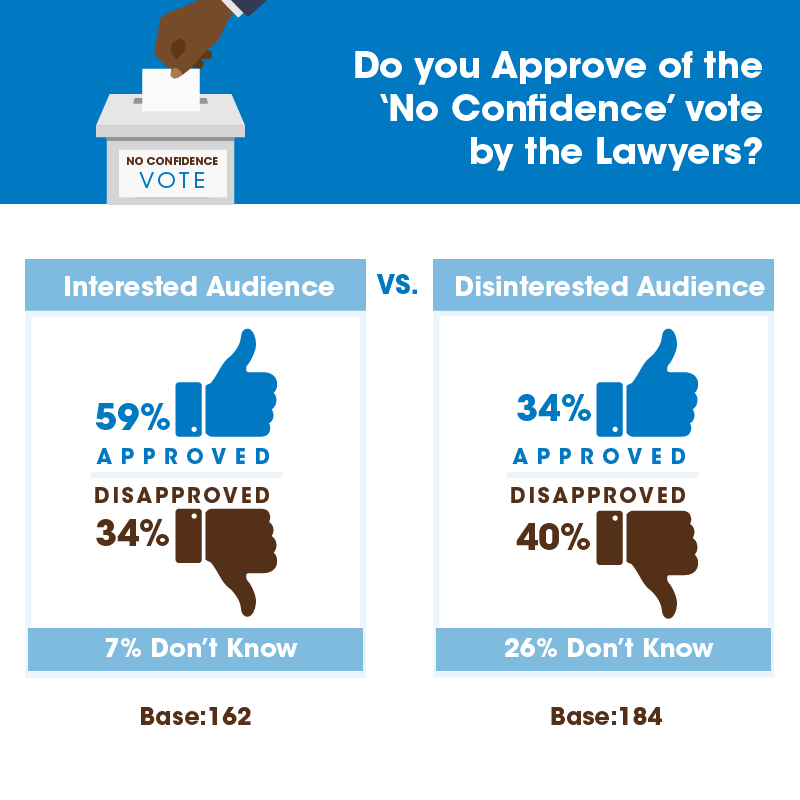
The Public Opinion Poll showed that just under half (47%) of all respondents agree that the lawyers’ action was a case of ‘putting the country first’. There was a sharp split between those in the interested audience and those who were disinterested on this subject. Almost twice as many of those in the first group as compared to those in the second group agree with the action. Twenty-eight percent (28%) of both groups disagree with the action.
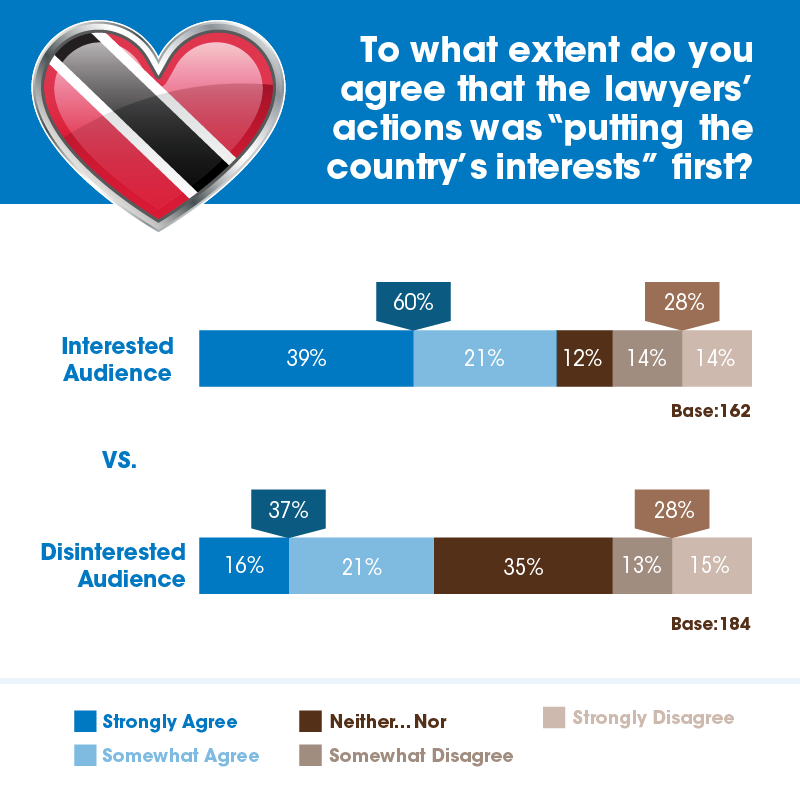
Approval for the Lawyers’ Vote- Further comments
Approximately half of all respondents approve of the ‘no confidence’ vote in the Chief Justice. Those who approved tend to be persons showing interest in the story.
Male participants, persons in the 45-54 age bracket and persons of East Indian descent were more likely to support the vote. These persons tend to hold the view that the CJ and the JLSC should resign. This can be linked to them also being more likely to believe that the incident has caused ‘a great deal’ or at least ‘a fair amount’ of hurt to the population.
Those not in support of the vote of ‘no confidence’ were more likely to disagree with the proposition of resignation and to believe that this situation had very little to no negative impact on the country.
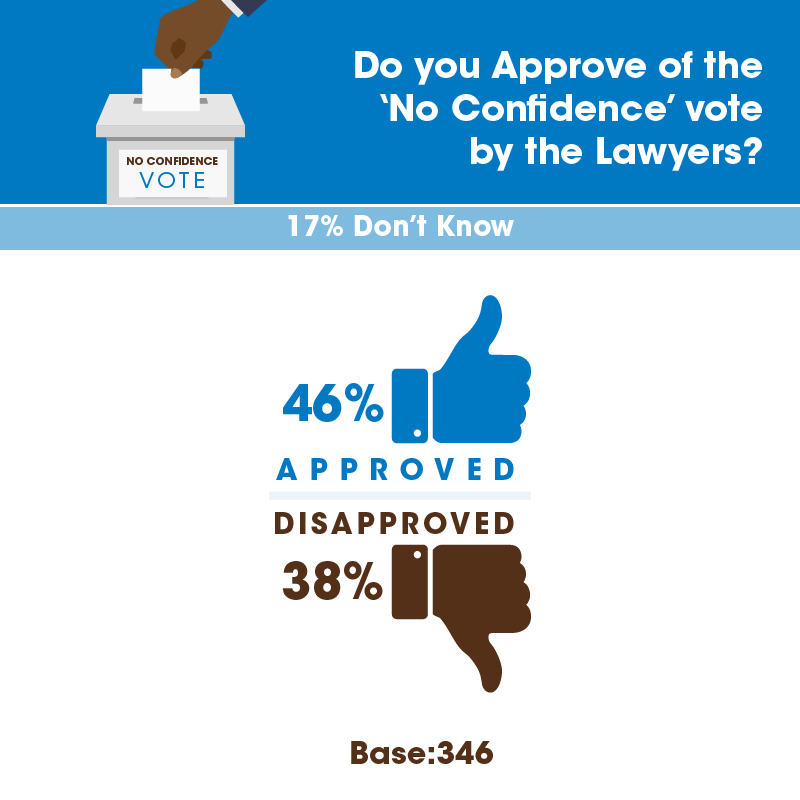
While 48% is in agreement that the lawyers’ actions was “putting the country’s best interests” first, a significant number of respondents was unsure of their opinion (24% on the fence). The 27% strongly agreeing with this sentiment were more likely to be paying close attention to the unfolding of the story. Those on the fence tend to not be avidly following the sequence of events.
Participants who were unsure were more likely to be females and maintained their ambivalence throughout the study. Those in agreement approved by the lawyers’ votes and supported the call for resignation while the views held opposite for those in disagreement.
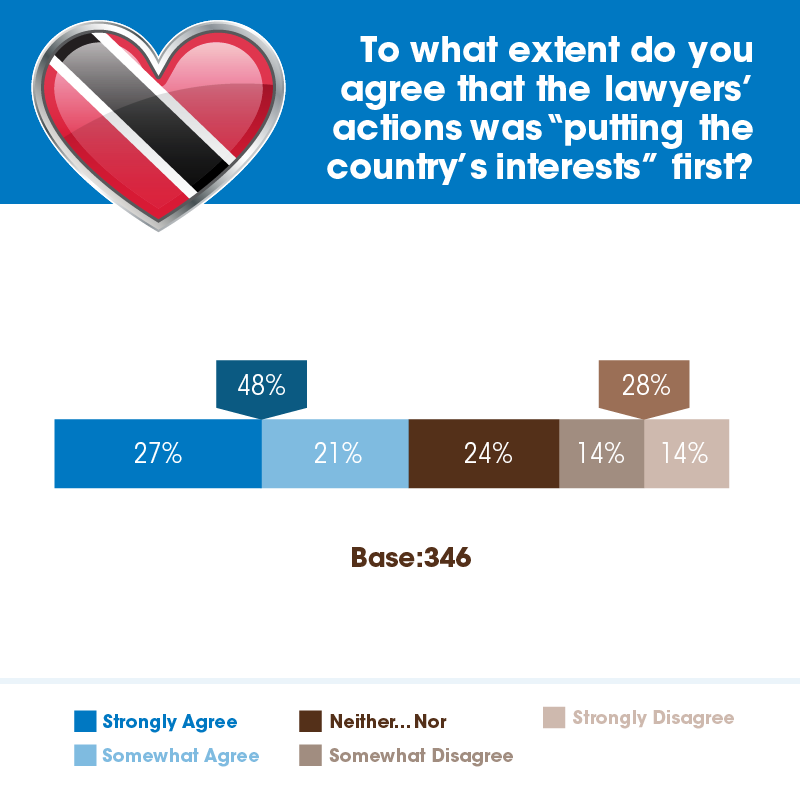
Should the CJ resign?
Only two in five persons are of the view that the Chief Justice and the Judicial and Legal Service Commission should resign. A higher proportion of respondents following the story closely (46%) are in support of the CJ and the JLSC resigning their posts compared to 32% of those who were not following the story closely). While it may appear that a higher percentage of the ‘interested audience’ disagrees (37% versus 28%) when compared to the ‘disinterested audience’ it should be noted that there is plurality of persons (40%) in the ‘disinterested audience’ who were fence-sitters- neither agreeing or disagreeing with this sentiment.
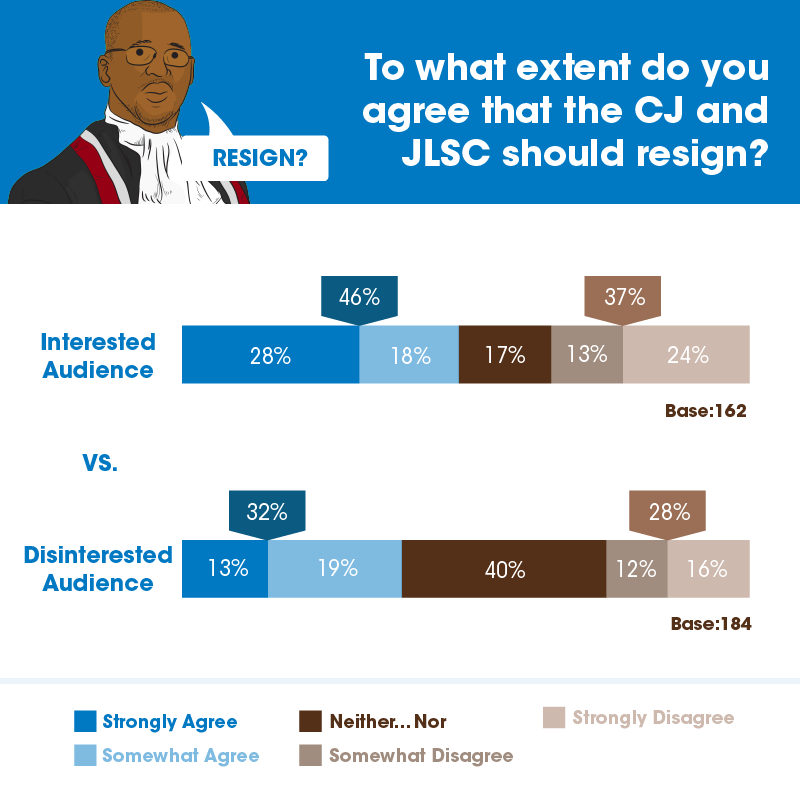
Just over half of the total sample believe that this ‘no confidence’ vote hurt the country either a ‘great deal’ or ‘a fair amount’. This sentiment is polarized: 62% of the ‘interested audience’ has this opinion compared to 44% of the ‘disinterested audience’. A fifth of all respondents holds the view that it has no effect on the welfare of the country.
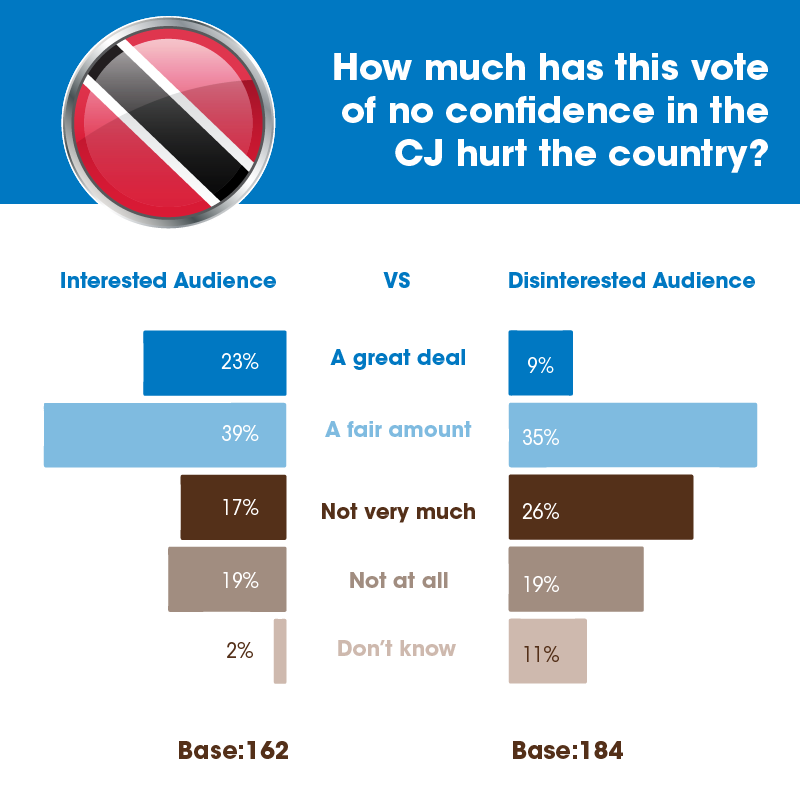
Should the CJ resign? Further Comments
A near three-way split in opinions takes place when asked their agreement with the motion for the resignation of the Chief Justice (CJ) as well as the Judicial and Legal Service Commission (JLSC). Just about 2 in every 5 respondents agreed with this (38%).Meanwhile, a third disagreed with the notion with a similar proportion being on the fence on their opinion of this (29%). However, those in
Meanwhile, a third disagreed with the notion with a similar proportion being on the fence on their opinion of this (29%). However, those in strong agreement are more likely to be respondents following the story closely (very closely or fairly closely).
Younger participants are largely undecided about this course of action. Participants over 55 years were more likely to disagree with the call for resignation while those in the 45-54 years age bracket tend to be in support of it.
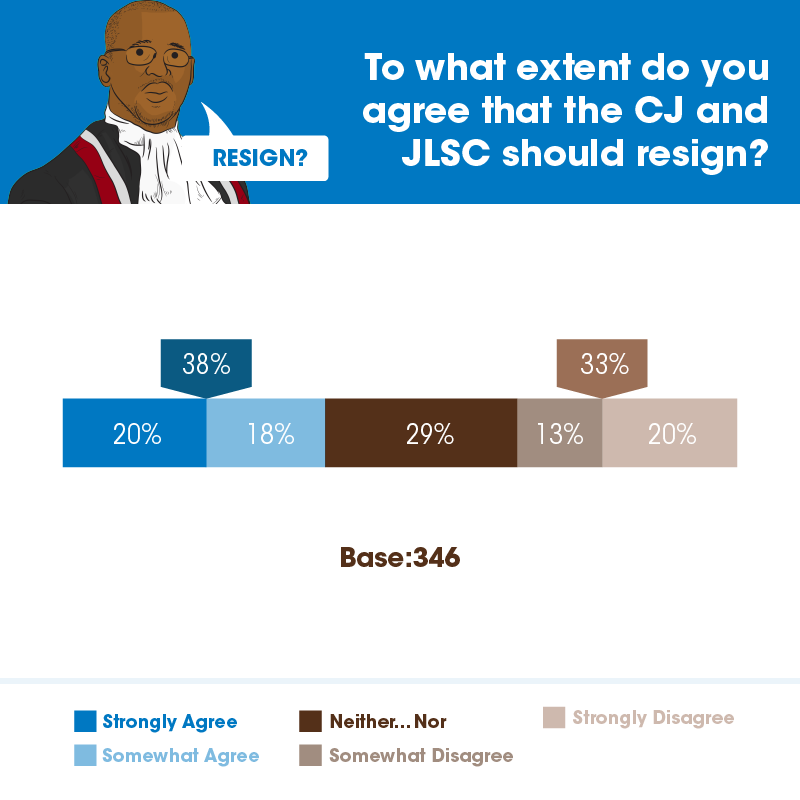
Just over half of the persons interviewed (52%), felt that the unfolding of this incident has hurt the country a great deal or a fair amount. Approximately 1 in every 5 persons thought the impact caused was ‘a great deal’. The data shows that these persons tend to be those paying close attention to the events.
Two in every five persons felt that this occurrence did not hurt the country very much or at all. A significant proportion (19%) also felt there was no impact at all.
Generally, the Public Opinion Poll revealed a polarized view. Participants tend to be consistent in their view of the situation.
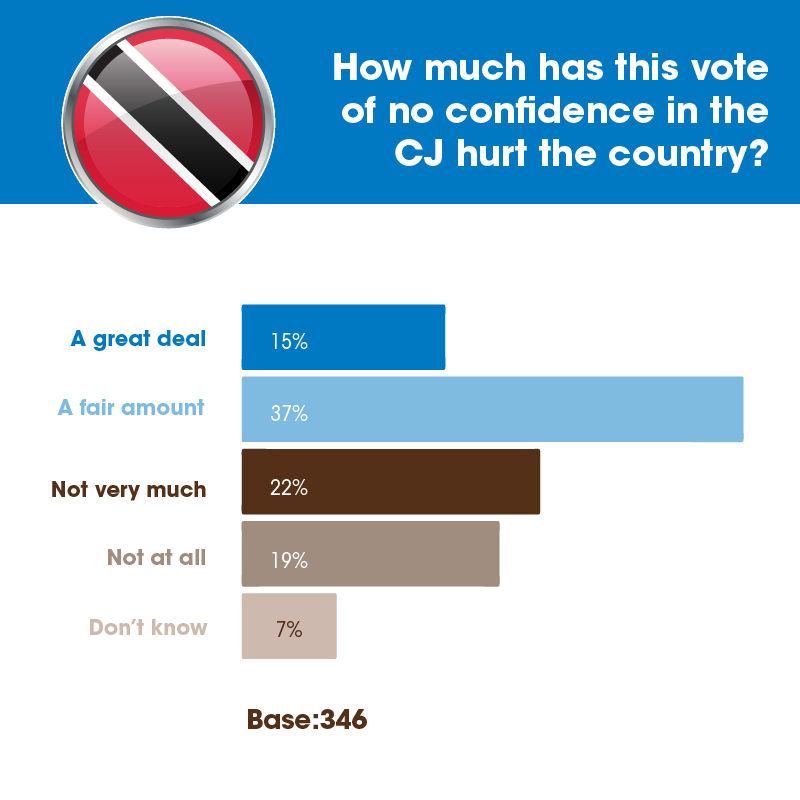
Our Public Opinion Poll highlighted that those who hold the view that the action by the lawyers was a case of “putting the country first” also agree strongly that a great deal of hurt has befallen the country. On the other hand, those respondents who disagree with the action by the lawyers have split down the middle on their assessment of the hurt done to the country. Half felt it is either ‘a great deal’ or ‘a fair amount’ while half think it is ‘not very much’ or ‘not at all’. Those held the view of ‘great hurt’ were mainly males, persons of East Indian descent and followed the story very or fairly closely. Those in disagreement were females and persons of African descent and may or may not have followed the story closely.
